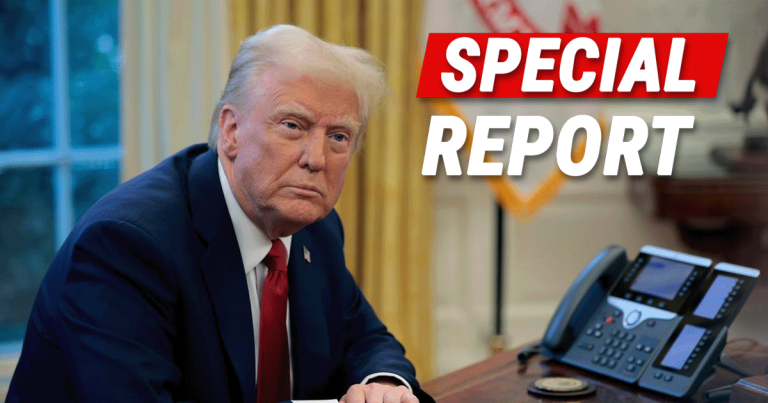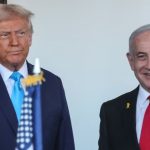
President Donald Trump’s ambitious tariff plan on dozens of countries worldwide has become the central focus of his administration’s twelfth week in office. The sweeping trade policy has drawn sharp criticism from Democrats and sparked concern among some economists.
Market reaction has been swift and severe. The S&P 500 and Nasdaq experienced their worst plunge of the decade late last week. The Dow Jones Industrial Average plummeted 2,231.07 points on Friday alone, a staggering 5.5% drop. When was the last time Wall Street’s panic actually helped the average American worker? I’ll wait.
Senate Minority Leader Chuck Schumer (D-NY) blasted the tariffs during a CNN appearance. Indeed, he called them a “massive assault on American families” that will only “help the billionaires.” Rich, coming from a career politician who’s watched American manufacturing collapse for decades without lifting a finger.
But President Trump remains undeterred. On Saturday, he delivered a bold message to the American people: “HANG TOUGH,” he declared on Truth Social, adding that “it won’t be easy, but the end result will be historic.”
From ‘Truth Social’:
We are bringing back jobs and businesses like never before. Already, more than FIVE TRILLION DOLLARS OF INVESTMENT, and rising fast! THIS IS AN ECONOMIC REVOLUTION, AND WE WILL WIN.
An Economic Revolution in the Making
The president’s unwavering confidence comes despite the immediate market turmoil. Trump insists these tariffs will eventually “supercharge” the economy as part of what he calls his “economic revolution.”
This revolution, according to the president, is already attracting massive investment. His claim of $5 trillion flowing into the American economy suggests that major corporations and investors are positioning themselves for a manufacturing resurgence on American soil.
For many conservative observers, this approach represents a fundamental shift away from decades of globalist trade policies. The globalist dream has been a nightmare for America’s manufacturing towns. Maybe it’s time for a wake-up call.
The administration appears willing to weather short-term market volatility for what it sees as long-term economic gains. Is short-term market volatility too high a price to pay for bringing jobs back home? Not if you ask the millions of Americans who’ve watched their livelihoods shipped overseas.
America’s New Trade Stance on the World Stage
The international dimensions of Trump’s tariff strategy are playing out in real-time. Israeli Prime Minister Benjamin Netanyahu visited the White House on Monday, with the 17% tariff recently placed on the longtime U.S. ally likely forming a key topic of discussion.
The Netanyahu meeting demonstrates that even America’s closest allies aren’t exempt from Trump’s “America First” trade posture. This approach signals to the world that the United States is fundamentally rethinking its economic relationships.
Some international leaders have expressed alarm at the new American stance. Others appear to be reconsidering their own trade policies in response. A former White House official noted that Trump’s meeting with Netanyahu creates a “domino effect” of countries “shaping up” to U.S. tariffs.
For traditional conservatives who have long advocated for American economic independence, this shift represents a welcome return to prioritizing domestic interests over international entanglements. America’s checkbook has been open to the world for far too long.
The Fight for Trump’s Economic Agenda
The battle for Trump’s economic vision extends beyond international borders to the halls of Congress. The Senate adopted Trump’s budget blueprint over the weekend, but its path through the House remains uncertain.
With Republicans holding only a slim majority in the lower chamber, internal party disagreements threaten to derail the president’s ambitious agenda. Rep. Andy Harris, the House Freedom Caucus chair, has already expressed reservations about supporting the Senate changes.
“I can’t support House passage of the Senate changes to our budget resolution until I see the actual spending and deficit reduction plans to enact President Trump’s America First agenda,” Harris stated on X, the social media platform formerly known as Twitter.
This internal Republican struggle highlights the challenges Trump faces in implementing his economic revolution, even with his party controlling both chambers of Congress.
The coming weeks will likely determine whether Trump can unify his party behind his bold economic vision or whether internal divisions will hamper his ability to deliver on his promises. When Republicans fight amongst themselves, the only winners are the Democrats and their globalist allies.
Key Takeaways:
- Trump’s “HANG TOUGH” message signals an unwavering commitment to America First economics despite market volatility.
- The administration claims $5 trillion in investment is already flowing toward American industry and manufacturing.
- Even America’s closest allies, like Israel, aren’t exempt from Trump’s mission to rebalance global trade.
- Traditional manufacturing communities may finally see a revival after decades of globalist policies left them behind.
Sources: Fox News


